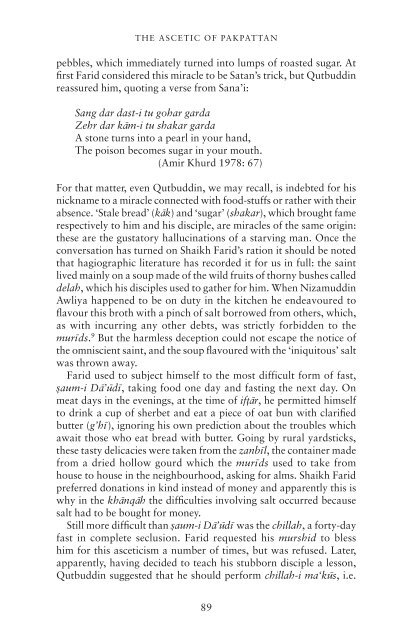Muslim Saints of South Asia: The eleventh to ... - blog blog blog
Muslim Saints of South Asia: The eleventh to ... - blog blog blog
Muslim Saints of South Asia: The eleventh to ... - blog blog blog
You also want an ePaper? Increase the reach of your titles
YUMPU automatically turns print PDFs into web optimized ePapers that Google loves.
THE ASCETIC OF PAKPATTAN<br />
pebbles, which immediately turned in<strong>to</strong> lumps <strong>of</strong> roasted sugar. At<br />
first Farid considered this miracle <strong>to</strong> be Satan’s trick, but Qutbuddin<br />
reassured him, quoting a verse from Sana’i:<br />
Sang dar dast-i tu gohar garda<br />
Zehr dar kām-i tu shakar garda<br />
A s<strong>to</strong>ne turns in<strong>to</strong> a pearl in your hand,<br />
<strong>The</strong> poison becomes sugar in your mouth.<br />
(Amir Khurd 1978: 67)<br />
For that matter, even Qutbuddin, we may recall, is indebted for his<br />
nickname <strong>to</strong> a miracle connected with food-stuffs or rather with their<br />
absence. ‘Stale bread’ (kāk) and ‘sugar’ (shakar), which brought fame<br />
respectively <strong>to</strong> him and his disciple, are miracles <strong>of</strong> the same origin:<br />
these are the gusta<strong>to</strong>ry hallucinations <strong>of</strong> a starving man. Once the<br />
conversation has turned on Shaikh Farid’s ration it should be noted<br />
that hagiographic literature has recorded it for us in full: the saint<br />
lived mainly on a soup made <strong>of</strong> the wild fruits <strong>of</strong> thorny bushes called<br />
delah, which his disciples used <strong>to</strong> gather for him. When Nizamuddin<br />
Awliya happened <strong>to</strong> be on duty in the kitchen he endeavoured <strong>to</strong><br />
flavour this broth with a pinch <strong>of</strong> salt borrowed from others, which,<br />
as with incurring any other debts, was strictly forbidden <strong>to</strong> the<br />
murīds. 9 But the harmless deception could not escape the notice <strong>of</strong><br />
the omniscient saint, and the soup flavoured with the ‘iniqui<strong>to</strong>us’ salt<br />
was thrown away.<br />
Farid used <strong>to</strong> subject himself <strong>to</strong> the most difficult form <strong>of</strong> fast,<br />
șaum-i Dā’ūdī, taking food one day and fasting the next day. On<br />
meat days in the evenings, at the time <strong>of</strong> ifţār, he permitted himself<br />
<strong>to</strong> drink a cup <strong>of</strong> sherbet and eat a piece <strong>of</strong> oat bun with clarified<br />
butter (g’hī), ignoring his own prediction about the troubles which<br />
await those who eat bread with butter. Going by rural yardsticks,<br />
these tasty delicacies were taken from the zanbīl, the container made<br />
from a dried hollow gourd which the murīds used <strong>to</strong> take from<br />
house <strong>to</strong> house in the neighbourhood, asking for alms. Shaikh Farid<br />
preferred donations in kind instead <strong>of</strong> money and apparently this is<br />
why in the khānqāh the difficulties involving salt occurred because<br />
salt had <strong>to</strong> be bought for money.<br />
Still more difficult than șaum-i Dā’ūdī was the chillah, a forty-day<br />
fast in complete seclusion. Farid requested his murshid <strong>to</strong> bless<br />
him for this asceticism a number <strong>of</strong> times, but was refused. Later,<br />
apparently, having decided <strong>to</strong> teach his stubborn disciple a lesson,<br />
Qutbuddin suggested that he should perform chillah-i ma‘kūs, i.e.<br />
89


